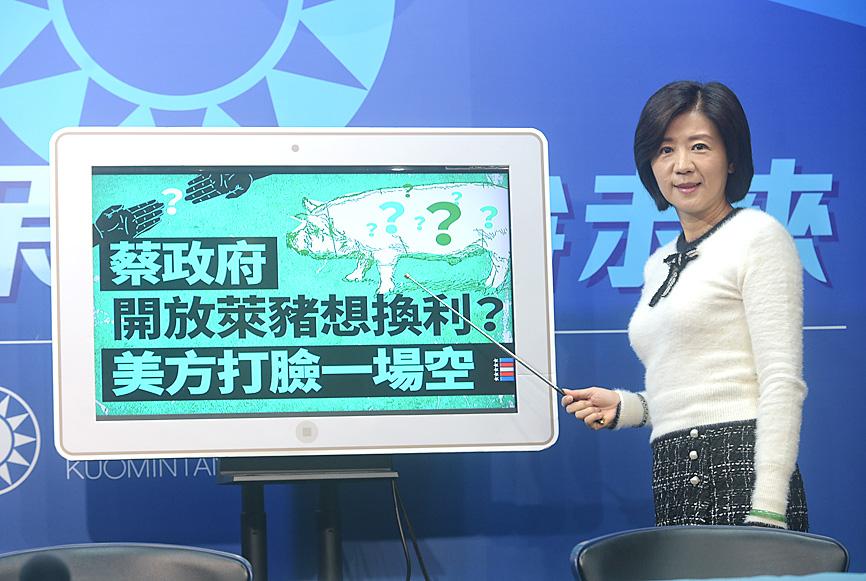The Chinese Nationalist Party (KMT) yesterday urged the government to rescind its decision to allow imports of US pork containing traces of ractopamine, saying that the policy might not lead to a trade agreement.
President Tsai Ing-wen (蔡英文) on Aug. 28 announced that from Jan. 1 Taiwan would set permissible residue levels of the animal feed additive in imported pork, and ease restrictions on imports of beef from US cattle aged 30 months or older.
The decision was “based on our national economic interests and consistent with our overall strategic goals for the future,” Tsai said at the time.

Photo: Chang Chia-ming, Taipei Times
KMT Culture and Communications Committee director-general Alicia Wang (王育敏) told a news conference in Taipei yesterday that US president-elect Joe Biden indicated in an interview that until the US solves its domestic labor, education and economic problems, it would not sign any new trade agreements with other countries.
In an interview with New York Times opinion columnist Thomas Friedman published on Wednesday last week, Biden said: “I’m not going to enter any new trade agreement with anybody until we have made major investments here at home and in our workers,” and in education.
Biden’s remarks mean that Taiwan might not be able to get a bilateral trade agreement or free-trade agreement in return for the meat imports regulatory changes, Wang said.
“If this is the case, we have to ask the Tsai administration ... will it still allow imports of ractopamine pork on Jan. 1 as scheduled?” Wang said, adding that the KMT wants Tsai to withdraw the decision.
Some Taiwanese had reluctantly accepted the ractopamine policy if it meant Taiwan would sign a trade deal with the US, she said, adding that the reality indicated that was not the case.
There is still time to reverse the decision, committee deputy director-general Lee Yong-ping (李永萍) said.
The Democratic Progressive Party’s (DPP) change of stance could at the time be explained by a possible tacit understanding between the Tsai administration and a US government led by Republican US President Donald Trump, Lee said.
However, Biden — a Democrat — is to be inaugurated on Jan. 20, she said.
The Republican and Democratic parties disagree on issues including trade, environmental protection, food safety and labor, she said.
“Is the US’ election of a new president, Biden, not a change in circumstances?” Lee asked, alluding to Tsai’s comment in her Aug. 28 speech that “circumstances have changed,” allowing Taiwan to “further open the market.”
It is unknown whether Biden’s administration would give Taiwan further support because of its changed policy on US pork imports, Lee said, adding that the DPP government should cancel the plan.

The National Immigration Agency (NIA) said yesterday that it will revoke the dependent-based residence permit of a Chinese social media influencer who reportedly “openly advocated for [China’s] unification through military force” with Taiwan. The Chinese national, identified by her surname Liu (劉), will have her residence permit revoked in accordance with Article 14 of the “Measures for the permission of family- based residence, long-term residence and settlement of people from the Mainland Area in the Taiwan Area,” the NIA said in a news release. The agency explained it received reports that Liu made “unifying Taiwan through military force” statements on her online

A magnitude 5.7 earthquake struck off Taitung County at 1:09pm today, the Central Weather Administration (CWA) said. The hypocenter was 53km northeast of Taitung County Hall at a depth of 12.5km, CWA data showed. The intensity of the quake, which gauges the actual effect of a seismic event, measured 4 in Taitung County and Hualien County on Taiwan's seven-tier intensity scale, the data showed. The quake had an intensity of 3 in Nantou County, Chiayi County, Yunlin County, Kaohsiung and Tainan, the data showed. There were no immediate reports of damage following the quake.

Actor Darren Wang (王大陸) is to begin his one-year alternative military service tomorrow amid ongoing legal issues, the Ministry of the Interior said yesterday. Wang, who last month was released on bail of NT$150,000 (US$4,561) as he faces charges of allegedly attempting to evade military service and forging documents, has been ordered to report to Taipei Railway Station at 9am tomorrow, the Alternative Military Service Training and Management Center said. The 33-year-old would join about 1,300 other conscripts in the 263rd cohort of general alternative service for training at the Chenggong Ling camp in Taichung, a center official told reporters. Wang would first

MINOR DISRUPTION: The outage affected check-in and security screening, while passport control was done manually and runway operations continued unaffected The main departure hall and other parts of Terminal 2 at Taiwan Taoyuan International Airport lost power on Tuesday, causing confusion among passengers before electricity was fully restored more than an hour later. The outage, the cause of which is still being investigated, began at about midday and affected parts of Terminal 2, including the check-in gates, the security screening area and some duty-free shops. Parts of the terminal immediately activated backup power sources, while others remained dark until power was restored in some of the affected areas starting at 12:23pm. Power was fully restored at 1:13pm. Taoyuan International Airport Corp said in a